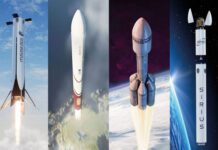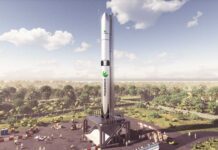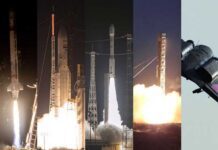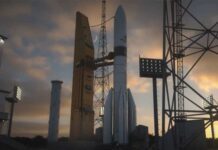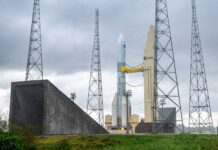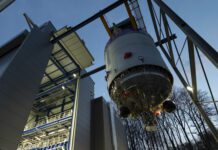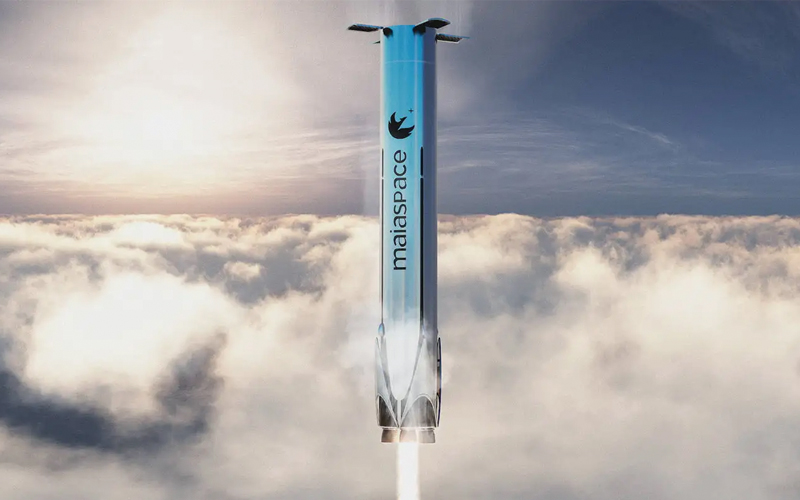
During an interview with French television channel B SMART, MaiaSpace CEO Yohann Leroy described the challenges of implementing reusability in a small launch vehicle. Specifically, Leroy explained that while the company was looking at a two-thirds drop in performance when the launcher was recovered, the model would not reduce the cost of the launcher by a similar amount. It should be noted that the interview was in French and that the below quotes are the result of automated translation services.
“What we know is that reuse has an impact in terms of performance regardless of the type of launcher you are working on, but this impact is all the stronger when the launcher has a reduced capacity in the case of MaiaSpace. The performance of our launcher when the first stage is recovered is divided by three compared to the launcher in an expendable configuration i.e. without recovery of the first stage. We divide the performance by three but the cost that we save by recovering the launcher – we do not divide the cost by three. So paradoxically implementing reuse on a small launcher has rather the consequence of increasing the costs per kilogram launched,” said Leroy.
However, Leroy went on to explain that the model would still be economically viable and even advantageous due to the fact that the launch vehicle could also be utilized in an expendable configuration.
“By developing a reusable launcher we have two launchers for the price of one or in other words we have a launcher with two optimized operating points. The operating point of the launcher when we recover the first stage and the operating point of the launcher when we consume the first stage and that changes everything. With this double launcher, we can attack a segment of the market that is wider than if we had a single consumable launcher optimized for a single operating point. That changes everything because all other things being equal no one will be able to address a wider market, have a higher rate, and therefore lower costs more quickly because we will cover the experience curve more quickly and ultimately have a business plan much more attractive for investors.”
The advantages and disadvantages of being an ArianeGroup subsidiary
Another interesting aspect of the interview was a discussion that explored the challenges of being a subsidiary of ArianeGroup. The company is currently 100% owned by ArianeGroup which will likely change slightly as MaiaSpace secures external funding.
“We are today a 100% subsidiary of Ariane and our objective is the objective of our parent company. The opening of our capital to third-party investors is the best guarantee of maintaining the autonomy we have today. So, I’m not going to lie about the fact that being a subsidiary of a large group also potentially has disadvantages. But I’m convinced the advantages this gives us are greater than these disadvantages. The advantage that this gives us is access to expertise that we would not have or that we could not have so easily acquired had we been a totally independent company. A disadvantage of being a subsidiary of a large group is being part of a certain number of processes and therefore being required to accept a certain number of constraints. Additionally, as we are a 100% subsidiary, and we are a subsidiary majority-owned by ArianeGroup we will be consolidated, our financial results will be consolidated in those of ArianeGroup and that means a certain number of financial constraints that we would not necessarily have if we were a startup. But once again these disadvantages seem very weak to me compared to the technological advantage that this gives us.”
MaiaSpace is on a mission
Despite being just over a year old, MaiaSpace has made significant strides on its way to a maiden flight in 2025. The company has already hired over 30 employees and has fleshed out an offering that includes a kick stage that will offer customers a greater amount of mission flexibility. The MaiaSpace offering is now also available for review on the company’s new website which it launched last week.
ArianeGroup has also made progress with the development of its Prometheus engine, which MaiaSpace will be utilizing for both the first and second stages of Maia. The methalox engine is being developed under a contract from ESA and was fired for the first time in November last year. MaiaSpace will also be utilizing key technology from the Themis reusable booster demonstrator which is expected to complete initial low-altitude hop tests in 2024.
MaiaSpace is expected to operate as an autonomous entity. According to Leroy not only will the company build the launch vehicle but it will not rely on ArianeSpace to operate and market the vehicle and will instead do that itself.
“Not only are we in charge of the development of our launcher, we are going to operate it. But we are also going to market it and that seems to me the best option if I may say so because that is our objective. It is not just to develop technologies, not just to develop a launcher even if it is part of our role to provide Europe with technologies that are key for its independence in terms of access to space. But we also want to build a company and to build a profitable company we must listen to our customers and therefore market our services ourselves,” explained Leroy
MaiaSpace does, however, fit into ArianeGroup’s larger plans. ArianeGroup hopes to develop a suite of launchers that will replace Ariane 6 and address the future launch requirements of Europe both big and small. MaiaSpace is the beginning of that larger journey.

